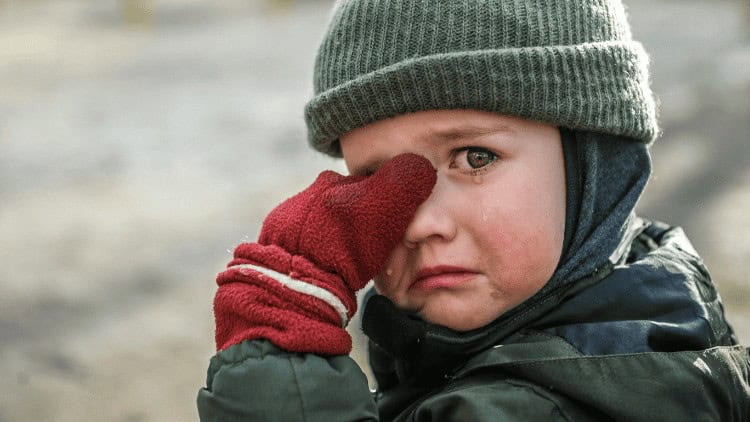Social support will become means-tested as millions of Ukrainians face war, displacement and poverty.

The Ukrainian government is continuing with wide-reaching reforms to its social-welfare system as the country faces the ever-increasing cost of war with Russia, now in its second year. National policy-makers and international financial institutions have expressed concern about the extent of state spending on social assistance, claiming a pressing financial need to switch to a much leaner model of state support for vulnerable people.
Experts are worried that these reforms could reduce state assistance in the long term. Indeed, the country’s recent $15.6bn loan agreement with the International Monetary Fund—regarded as a breakthrough for the country’s financial stability—has tied the government into cutting back on social expenditure.
Economic damage
Despite the decline of the Ukrainian economy and state budget deficit, the Ministry of Social Policy’s budget increased by almost 20 billion hryvnias (€491 million) this year compared with last. In total, it amounts to more than 445 billion hryvnias (€10.9 billion). Spending on social programmes and pensions makes up 17 per cent of Ukraine’s entire state budget for 2023, second only to spending on the army and security (43 per cent).
The ministry argues that a new framework is needed because the administration of social benefits is inefficient and the system opaque and complex. These reforms are however coming at a time when millions of Ukrainians face displacement, job losses and rising prices in a war-ravaged economy.
The invasion has caused at least $130 billion in direct damage to Ukraine and a further $290 billion to the country’s economic activity, according to a World Bank ‘needs assessment’ in March. The report says the poverty rate—the proportion living on less than $6.85 per day—has increased from 5.5 to 24 per cent of the population in the past year. To date, several million Ukrainians have lost their homes, five million are displaced inside the country and more than eight million are refugees abroad.
Survivors of the Russian invasion are likely to have complex needs. The Ukrainian government estimates that, by the end of the war, veterans could make up more than 10 per cent of the population. So far, 14,000 Ukrainian civilians have been injured, according to the United Nations. All this begs the question: could a more ‘targeted’ model of social assistance leave Ukrainians literally out in the cold?
‘Significant challenges’
Ukraine’s social-policy reforms have been given new impetus by the existential challenge of the invasion but the process was started by Volodymyr Zelenskyy’s presidential administration years ago. Under the reform, the government has sought to move away from Soviet-era, status-related benefits—whereby, for example, single mothers, veterans or people with disabilities receive financial assistance and privileges on the basis of belonging to a group.
‘In recent years, the system of social support of the population in Ukraine has undergone significant changes, but it still needs to be reformed,’ Ukraine’s Ministry of Social Policy said. ‘Additional challenges have fallen on the social-protection system regarding the ability to quickly respond to new and significant challenges that have arisen as a result of the war.’
In March the prime minister, Denys Shmyhal, outlined the main changes that await Ukrainians, promising ‘a new social contract between the state and citizens’ as part of the government’s action plan for 2023. This involves ‘strengthening control’ of social benefits by digitalisation, reviewing the state’s financial obligations with a view to reducing their number, checking if a citizen really requires state assistance and providing people with social services (rather than funds) to help them ‘overcome their difficult circumstances’ and become economically independent again.
Means-testing payments
The government says it will enhance how social payments are targeted, improve databases of recipients and increase payments after someone’s needs are assessed. It also plans to introduce guaranteed basic social assistance, which will be means-tested and aimed at the most vulnerable sections of the population.
For the social-policy minister, Oksana Zholnovych, the priority is to ‘provide certain categories of people with a certain set of social services that will allow them to overcome difficult life circumstances’. She said: ‘We want our people to stop living with the feeling that someone owes them something. We want to give everyone a fishing rod that will help them catch fish—to gain economic independence, and with it a decent life.’
Natalia Lomonosova, senior social-policy analyst at the Ukrainian think tank Cedos, said the changes would include a ‘more scrupulous’ assessment of incomes when dealing with applications for assistance. Most forms of financial assistance would be ‘tied to people’s incomes rather than status’.
One of the recent changes is that officially unemployed Ukrainians can now be made to carry out community work, paid at the minimum wage, instead of receiving benefit payments. This was already in evidence last year, when, for example, 139 unemployed people in the Kyiv region were involved in ‘socially useful work’.
In summer 2022, Ukraine started work on a new ‘Social Code’, which would systematise the country’s ‘chaotic and outdated’ social legislation, according to the government. The current system, reformers argue, has too many status- or group-related benefits, in practice partly delayed or unpaid because of the budget deficit.
Competition between providers
The government is also introducing a new national purchaser of social services. The idea is based on the country’s new healthcare system, in which a central National Health Service pays hospitals for the services they provide.
‘Each local community has to assess how many social services need to be provided, then they have to choose the best provider of these services. What’s interesting is that [the reform] allows competition between private and municipal providers of social services. The state compensates the cost of providing services,’ Lomonosova explained.
The social-policy minister, Zholnovych is optimistic: ‘I think we will be able to scale this successful experience in our social policy and create a similarly effective, proactive network of social service providers, mostly non-state.’
Reforming social legislation will also ‘stop the wave of legal decisions’ by national courts and the European Court of Human Rights against the Ukrainian government for violating social rights, claimed Halyna Tretiakova MP, head of the parliamentary committee on social policy. These legal decisions were not being implemented, she said, so ‘the amount of compensation that the state owes is only rising’.
As a prerequisite for financial assistance from the IMF, the Ukrainian government committed itself to drawing up a final version of its new social-policy vision—together with assistance from the World Bank—by the end of January this year. openDemocracy asked the Ministry of Social Policy and the Ministry of Finance for a copy of the concept note but they refused to share it. The World Bank did not respond to a request for comment.
Debt ‘unsustainable’
The IMF’s new $15.6bn loan, announced in late March, has locked Ukraine into a range of fiscal-policy measures. Notably, the country is required to make ‘substantial changes to pension and social safety nets’ to offset wartime pressure on public finances, reduced tax revenue and the need to service its extensive foreign debt. The IMF calculates that Ukraine will have a ratio of debt to gross domestic product of 98 per cent this year—and that, without restructuring, its debt will be ‘unsustainable’.
‘Given the [external] debt burden and the difficulty in repaying, [the Ukrainian government and IMF] want to change the country’s social programmes to find a way to limit who gets government benefits,’ said Barrie Hebb, a development economist who advises on international aid. ‘What they are talking about is dealing with Ukraine’s debt burden over time, by making sure that the government reforms cut back on structural expenditures sufficiently so it can deal with debt and cyclical expenditures.’
There is however concern that a reduced social safety net could dissuade people from returning to Ukraine, even after the war is over. ‘Ukraine has already had a severe demographic crisis,’ said Hebb. ‘This should fuel a discussion about how to attract and retain labour in Ukraine as part of reconstruction. Why would someone want to stick around and work for 20 years if there is no pension guarantee in the country? And no social protection?’
Lomonosova believes that a strong reaction from Ukrainian society to the reforms is unlikely, because ‘only a relatively limited’ number of people receive social assistance. ‘You have to understand that the reform is moving slowly, gradually,’ she said.
This first appeared on openDemocracy


